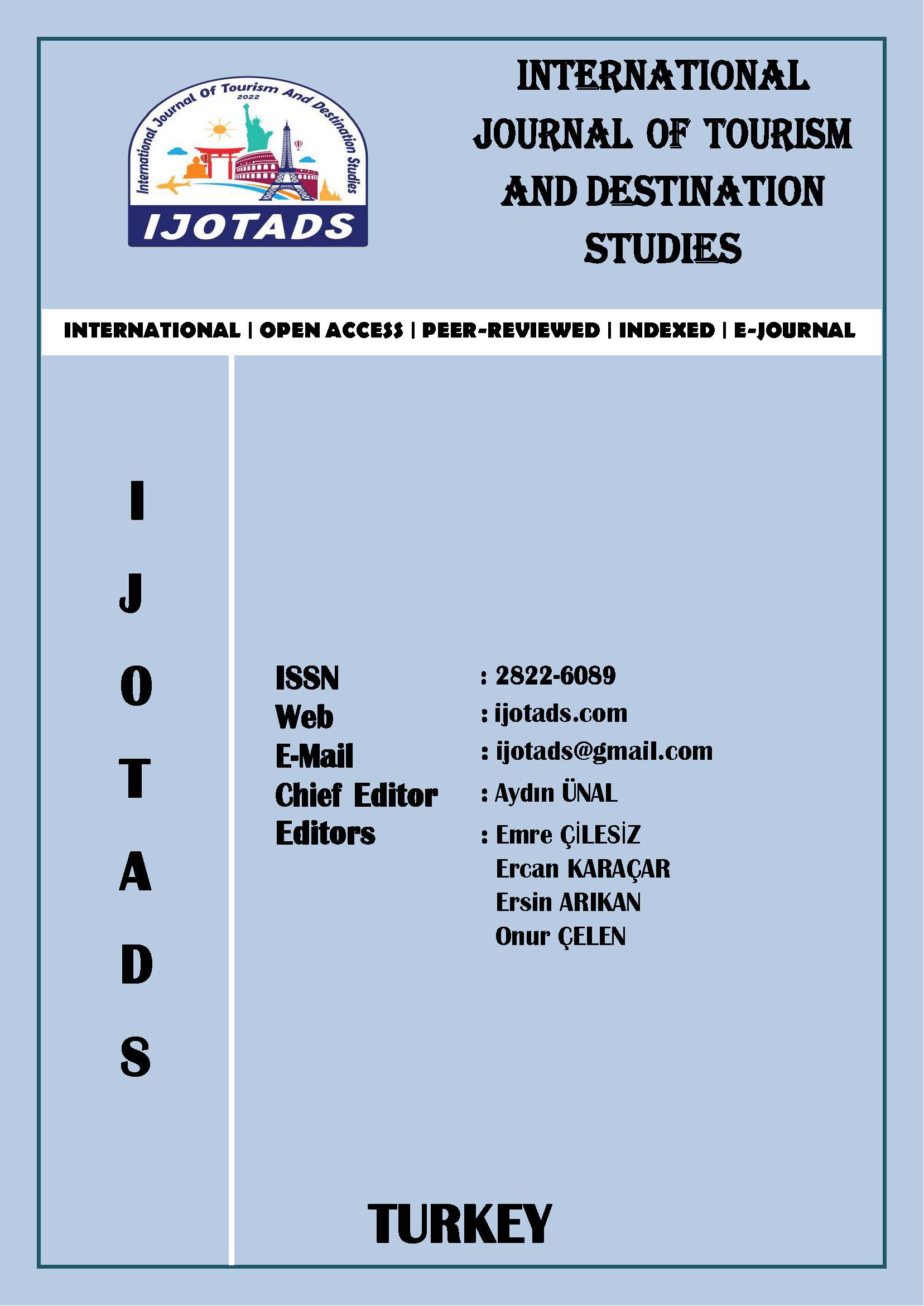Üniversite Öğrencilerinin Boş Zaman Değerlendirme Eğilimlerinin ve Rekreasyonel Aktivitelere Katılımına Engel Olan Faktörler: Sinop Üniversitesi Örneği
Author :
Abstract
Bu çalışmada üniversite öğrencilerinin boş zaman değerlendirme eğilimlerinin ve rekreasyonel aktivitelere katılımlarına engel olan faktörlerin belirlenmesini amaçlamaktadır. Bu kapsamda hazırlanan anket formu aracılığıyla Sinop Üniversitesi Turizm İşletmeciliği ve Otelcilik Yüksekokulu’nda öğrenim görmekte olan Rekreasyon Yönetimi, Turizm Rehberliği ve Gastronomi ve Mutfak Sanatları Bölümü öğrencilerinin görüşleri belirlenmeye çalışılmıştır. Araştırmanın veri toplama sürecinde anket tekniğinden yararlanılmıştır. Araştırmanın veri toplama süreci (1 Mart-1 Nisan 2023) içerisinde ulaşılabilen ve aktif öğrenime devam eden öğrenci sayısı 557 olarak tespit edilmiştir. Ancak 6 Şubat 2023 tarihinde yaşanan Kahramanmaraş Depremi ve beraberinde uzaktan eğitime geçilmesi örneklemin bütününe ulaşılmasına engel oluşturmuştur. Tüm bu nedenler ve Google Anket üzerinden veri toplama sürecinin yürütülmesi 100 öğrenci ile veri kütlesini sınırlandırmıştır. Araştırma sonucunda anketlerden elde edilen veri seti SPSS 23.0 istatistiki veri programında analize tabi tutulmuştur. Yapılan analizler sonucunda; katılımcıların %32’si aktivitelerin yorgunluk hissi vermesini, %45’i kendini yorgun hissetmesini, %36’sı sakatlanma korkusunu, %43’ü kendini güvende hissetmemesini, %34’ü sosyal ortamlardan mutlu olmamasını, %41’i öğrenme kaynağını bilmemesini, %36’sı ulaşımın zaman almasını, %41’i çalışma zamanının yoğun olmasını, %34’ü ailesi için ayırmak zorunda olduğu zamanı, %38’i sosyal etkinlikler için ayırmak zorunda olduğu zamanı, %41’i program zamanının uygun olmamasını, %42’si rekreasyon etkinliğine nerede katılacağına bilmemesini, %39’u rekreasyon etkinliğini kendisine öğretecek kimsenin olmamasını, %39’u tesis donanım yetersizliğini, %37’si tesislerin kalabalık olmasını, %45’i sunulan hizmetleri beğenmemesini, %34’ü eve yakın imkanların olmamasını, %29’u arkadaşlarının zamanının olmamasını, %27’si beraber katılacak kimsenin olmamasını, %29’u arkadaşlarının etkinliklere katılmasının hoşlanmamasını, %30’u geçmişte bu tür etkinlikleri sevmemesini, %35’i ilgili olmamasını ve %34’ü rutin programını bozmak istememesini önemli düzeyde rekreasyonel katılımı engelleyicisi olarak değerlendirmektedirler.
Keywords
Abstract
In this study, it is aimed to determine the leisure tendencies of university students and the factors that prevent them from participating in recreational activities. In this context, it was tried to determine the opinions of the students of Recreation Management, Tourism Guidance and Gastronomy and Culinary Arts Department, who are studying at Sinop University School of Tourism and Hotel Management, through the questionnaire form prepared. Questionnaire technique was used in the data collection process of the research. During the data collection process of the research (1 March-1 April 2023), the number of students who could be reached and continued active education was determined as 557. However, the Kahramanmaraş Earthquake that took place on February 6, 2023 and the accompanying transition to distance education created an obstacle to reaching the entire sample. For all these reasons and the execution of the data collection process via Google Survey, the data mass was limited to 100 students. As a result of the research, the data set obtained from the questionnaires was analyzed in the SPSS 23.0 statistical data program. As a result of the analyzes made; 32% of the participants stated that the activities gave a feeling of fatigue, 45% feel tired, 36% fear of injury, 43% not feeling safe, 34% not being happy with social environments, 41% not knowing the source of learning, 36% of them say that transportation takes time, 41% is intensive working time, 34% of the time they have to spare for their family, 38% of the time they have to allocate for social activities, 41% of the program time is not suitable, 42% do not know where to participate in the recreation activity, 39% do not have anyone to teach them about the recreation activity, 39% did not like the lack of equipment, 37% the facilities were crowded, 45% did not like the services provided, 34% do not have facilities close to home, 29% do not have time for friends, 27% do not like that there is no one to attend together, 29% do not like their friends to participate in activities, 30% did not like such activities in the past, 35% consider it not relevant and 34% not wanting to disrupt their routine program as a significant obstacle to recreational participation.





